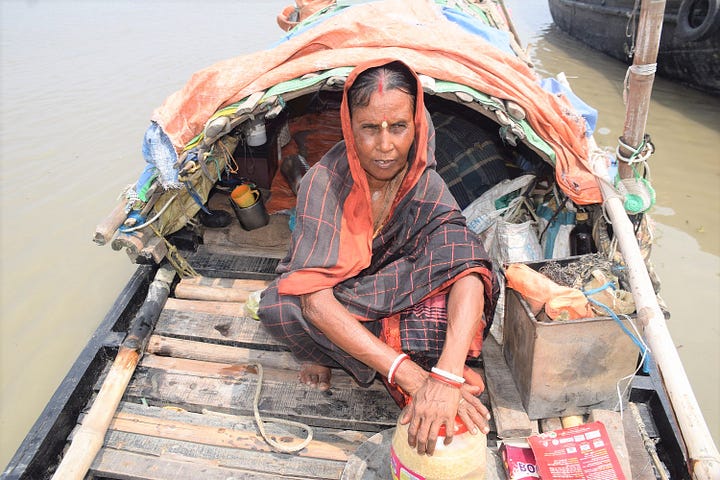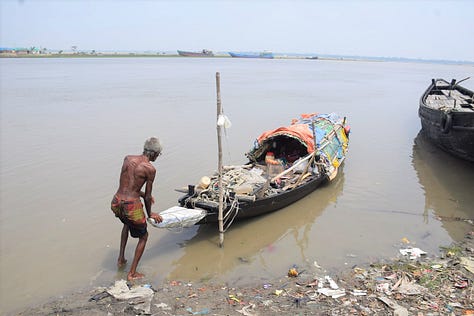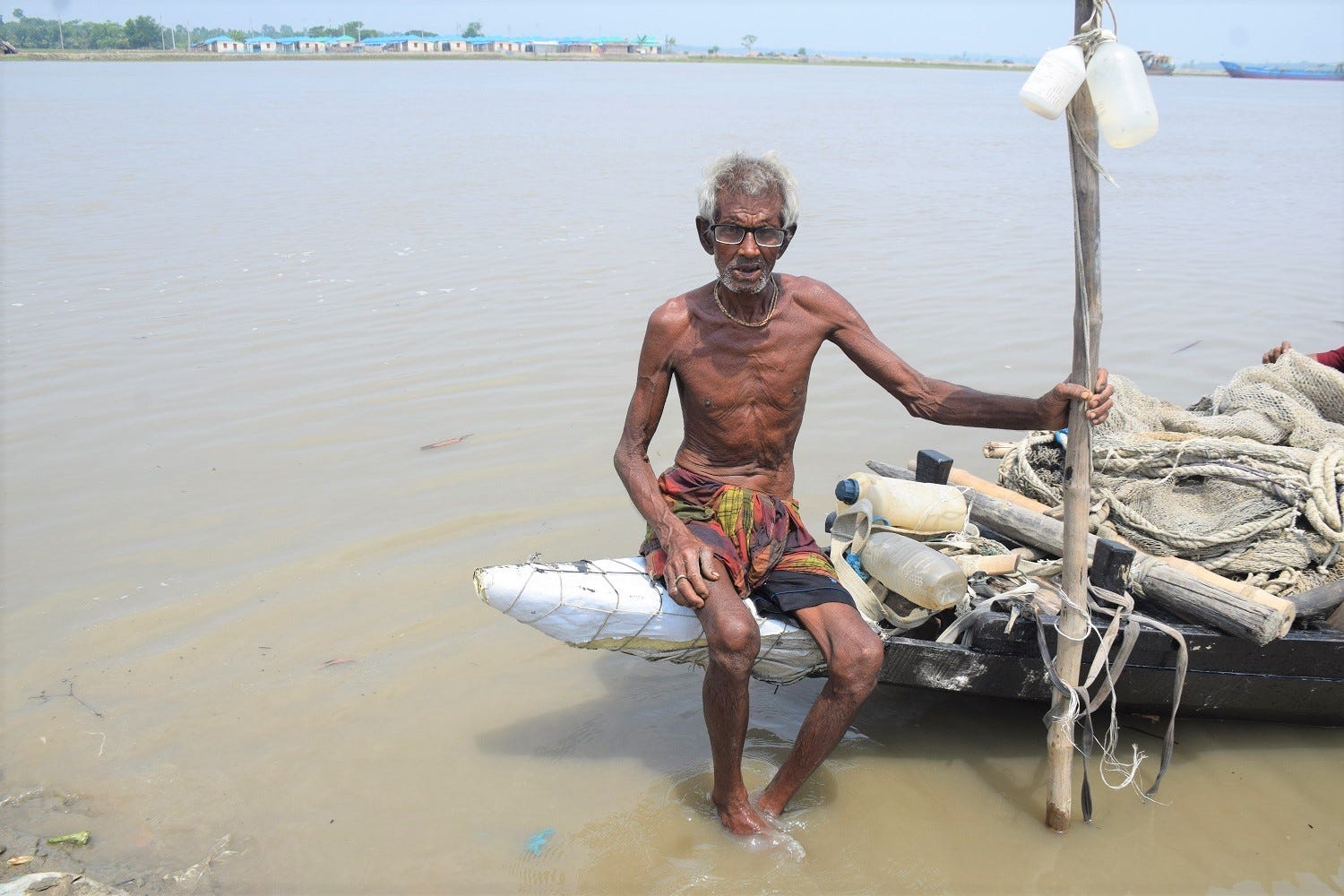Faced with natural hazards, Sukhen Biswas is forced to live a ‘boat life’
The boat sways in the tidal waves of the Kapotaksha river. Tidal water is about to overflow the bank. In the hot sun at noon, children swim in the Kapotaksha river; Adults are busy at work. Boat builders are hammering away under colorful tents by the river. The sounds of hammer echoing on Boalia Bridge. The smoke rising from the kitchens of some of the dense houses on the banks of the river tells of the preparation of lunch. But Sukhen Biswas is not busy. The stove in his boathouse was still unburnt. Wife Namita Rani Biswas is busy in daily prayers at the temple. This couple was going to the river for several days that day. The story is from the cyclone prone area of south west coast of Bangladesh.
Sukhen was coming towards the boat. The bones of his body are clearly visible. Going fishing for a few days, so Sukhen was busy that day with some preparations. Four daughters and one son of Sukhen who lost his life battle. The girls are married. Son Vidyut Biswas is unbalanced. One of his daughters is living in a mud house on government land on the bank of Kapotaksha river. Vidyut Biswas, mentally challenged, lives in a room built by his sister. Sukhen could also stay in his daughter's house; But it is not written in Sukhen's fate. He did not have a place to stay in his daughter's house. Sukhen is forced to live in his fishing boat. In Boalia Malopara, from the Kapotaksha River to the Sibsa River Bridge, they make a living by throwing small ‘bihundi’ nets and catching fish. Regarding such a floating life, Sukhen said, ‘My land and house have been destroyed by the Kapotaksha river. I’m homeless now. Stayed here and there at one time in another land. I’m a poor man. No money to buy land. So I’m forced to live on a boat.’
Malopara is the name of this village in Gadaipur Union on the banks of Boalia Bridge on the banks of Kapotaksha river. The distance of this area from Paikgacha upazila headquarters of Khulna district is about six kilometers. There is a bridge on the Kapotaksha river here, making the communication between the other side easier. The other side of the river is also part of Gadaipur Union. However, one can easily go to Satkhira Sadar from here by crossing Boalia Bridge. As the roads have improved, the living conditions of the people of Boalia Malopara have improved to some extent. But due to the erosion of the Kapotaksha river, many families on the banks are facing extreme crisis. Sukhen Biswas is one of them. Due to the erosion, several families have moved to other places. Sukhen did not have that chance. So his trust is in this boat. Along with his wife Namita Rani Biswas, they caught fish in this boat and lived on the boat. Boats go from Kapotaksha River to Shivsa River.
The intense heat of the hot sun at noon. Sukhen collected few days worth of rice. So he was going to the boat. A nearly wrecked boat moored at Malopara Ghat. Nets and other fishing gear are strewn across the hull of the boat. They spend their lives in a small piece of boat house. Sometimes high tidal pressure, sometimes storms, sometimes cyclones — everything Sukhen-Namita has to deal with. Even in the face of hundreds of adversities, their ‘boat life’ is going from one place to another at the last age.
Sukhen's sigh between the words — ‘Once upon a time I had a piece of land on the banks of this Kapotaksha river. There was a place to live. I used to earn my living by going to the boat from home and catching fish. But my land was lost due to erosion of Kapotaksh. I also lost my residence. I’m forced to live on a boat. I no longer have a place in the land.’ — Saying the words, Sukhen seemed to go back to those old days. Maybe never thought of such a life.
Sukhen Biswas has been living a floating life in a dinghy boat for more than a century. The Kapotaksha river has destroyed his last house. Now he has no land, no house. In old age, Sukhen Biswas has fallen out of the land life. A government shelter project has been constructed on the west bank of Kapotaksha river in Malopara village of Boalia. The houses of Malopara have been demolished and new land has arisen on the other side of Kapotaksha. Shelter project has been built on that land. But many others like Sukhen have been deprived of housing in that project. As a result, Sukhen never returned to the land. So this 68-year-old man is living a floating life in a dinghy with his wife Namita Biswas. This couple spends a few days floating in the water, sometimes eating and sometimes not. They fought against various adversities while fishing in the Kapotaksha river and Shivsa river for their livelihood. Yet Sukhen dreams of winning the battle for life — if he gets a house in a government housing scheme. Sukhen dreams of going back to land life again. He has been fishing hard day and night in the river with a net.


This elderly couple has spent more than an age floating in a small wooden boat; Which is very risky. The boat is their home. Major accidents can happen at any time. People of ‘nomadic’ or ‘bede’ race in Bangladesh are used to living in boats for generations. But despite not belonging to the ‘nomadic’ or ‘bede’ race, Sukhen was destined to live on a boat. At night, Sukhen's small boat is illuminated by solar lights. In the afternoon, the boat's stove is lit for dinner. Lunch is not cooked most of the time. Continue with dry food. In this way, Sukhen family has been living floating in the river. This poor ‘Malo’ family is far away from modern civilization. People of Malo community are Hindus. Most of the families in Boalia Malopara have been fishing for their livelihood for generations. Many families with big boats go fishing in Dublar Char of Sundarbans during winter season. Fishing has improved the economic status of many people. But some families could not change the situation. They could not keep pace with natural hazards. Sukhen is one of them.
Natural hazards have robbed Sukhen of everything. His boat was damaged by Cyclone Amphan in 2020. The boat was lifted from the river and thrown away. The boat broke and crashed. At that time, he was borrowing money. He bought the boat with a loan of 15,000 taka with great difficulty.
Sukhen said, ‘This boat is my everything. Cast a net in the river with a boat and catch fish. My house is on the boat. 15-20 days of the month fishing near Shivsa Bridge. We sell the fish that we get and collect the necessary food. At night, we tie the rope of the boat to the tree on the river bank. If we get news of a storm, we tie the boat inside the canal. Sometimes I come to the Kapotaksha river in Boalia Malopara and take food to my daughter's house and go to the boat. After eating at night, I sleep on the boat. There are no fish in the river like before. As a result, it becomes very difficult to continue living. 1-2 kg of fish is obtained once the net is cast. Somehow the family is living by selling this fish.’



While it is possible for a man to live on a boat, it is difficult for a woman to live on a boat. Sukhen's wife Namitha Rani Biswas has been doing the hard work for more than an age. Namita said, ‘We had a small house to live in. Our daily nutritional needs were met by growing vegetables in our backyard. Earlier, there was a lot of fish in the river. I never imagined living on a boat. As a woman I suffer a lot. Just as there are problems with cooking on a boat, there are also problems with other tasks. After cooking I also have to help in fishing. We do everything together. I faced many storms. However, life has to continue like this.’
Sukhen demands a house from the government. Having a house to live in can make his life a little easier at the end of his life. Sukhen said, I wanted a house in the shelter project built on the government land on the west bank of Kapotaksh river in Gadaipur. But I didn't get allotted there. I'm afraid to stay on the boat, what happens when the storm blows! If you give me a house, I can live safely for the rest of my life.
Paikgacha Upazila Nirbahi Officer (UNO) Momtaz Begum said about Sukhen's claim, ‘We have to find out if there are any vacant houses in the riverside shelters. Sukhen will be given a house if an empty house is found somewhere.’






